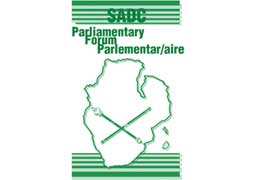
The South African Development Community Parliamentary Forum’s (SADC-PF) Regional Women Parliamentarians Caucus converged recently to launch the Stakeholders’ Consultative Process on SADC’s Gender-Based Violence (GBV) Model Law. It’s hoped that this consultative process will assist in cultivating solid policy and legislative proposals that will assist the member states of the SADC to harmonise their response against GBV.
The Chairperson of the SADC-PF Regional Women Parliamentarians Caucus, Ms Anne Marie Mbilambangu, gave a historical context and the process undertaken to promulgate this model law. According to her, the motion to incept this model law was motivated during the 44th Session of SADC-PF in Mozambique. Thereafter, a consensus was reached that a process of incepting GBV Model Law in the region should be set in motion. This, she pointed out, because GBV is a constant threat to peace, security and to the objectives of human development in the region.
According to her, this consultative process will comprise a broad sweep of stakeholders from lawyers, law-makers, jurists, judges, police, gender commission, human rights and gender activists to ministries responsible for gender mainstreaming and advocacy.
Ms Caroline Peters, a survivor of gang rape and a community advocate against GBV, gave a chilling reminder of the harrowing effects of this scourge. “I can reminder to this day when I was gang raped three months before I turned 16,” she said. She continued: “It’s sad to realise that this scourge still continues unabated. After what happened to me, it’s devastating to learn that in 25 seconds a woman is raped in South Africa. That we have become a rape capital of the world. That is why I have decided to be a defender of women’s rights and an advocate against GBV.”
She added: “I even find it difficult to celebrate the Women’s Month when women are still brutally raped and murdered. As much as I commend the inception of this model law by SADC- PF, I hope that it will be implemented and yield its desired effect. I am saying this because South Africa has noble law aimed at eradication sexual violence and related offences, but have not been implemented effectively.”
Delivering her keynote address during the launch, the Second Deputy Speaker of Malawian Parliament, Ms Aisha Adams, stated that the inception of this model is a recognition of the endemic nature of GBV in the region. In her view, the lockdown restriction of Covid-19 exacerbated this situation even further. She said: “There are findings that sexual harassments and the exploitation of children during lock down rose exponentially.” Counting its costs, she claimed: “GBV has cost South Africa well over R1 billion.” She said a lasting solution to GBV is the economic empowerment of women. “it’s through women empowerment that we can achieve gender equality and equity.”
But it’s not all doom and gloom, she opined, she said the SADC GBV Framework Strategy has come up with an action plan, interventions and tools such as the training of judges and police on GBV cases as well as the operational procedures and referrals of GBV cases to increase convictions and to half GBV by half in 2030. While the GBV Model Law seeks to come up with guidelines that will assist the SADC member states to initiate their own legislation on GBV, to domesticate to SADC GBV Model Law to be in line with international, continental and regional commitments.
This model law is compressive and its approach, guidelines and instruments are overarching and are based on international best practices, claimed The Drafter of SADC PC GBV Model Law, Ms Eva Jhala. This law, she asserted, is based profound international research and we are confident that it will go a long way in fighting the scourge of GBV in the region. She said: “Fundamentally, it will assume a human rights posture and its policy and strategic approach is sound. One of the policies it advocates for is the establishment of its own budgetary line by member states as a mechanism to mainstream GBV.”
Critically, it based on a solid recourse to justice, “without which, it won’t achieve its objectives,” she contended. However, at the heart of its pulse, is data gathering and analysis to keep member states abreast about the growing and changing trends in their fight against GBV, she said. In her view, the implementation of the above and the induction of judges and police as well as those in the value chain of the justice system of the member states can effect swift conviction of the perpetrators of GBV.
What a momentous time this is, exclaimed Ms Rouzen Eghtessadi, of the Southern African AIDS Information and Dissemination Service (SAFIDS). She said: “It illustrates our tenacity; the birth of the significant instrument to curb GBV.” She added: “We have seen the starkest and heart wrenching incidents of GBV during the lockdown. Through this initiative, we vow that the victims of GBV will no longer be just statistics. That we have at our disposal an instrument that can bring an end to this epidemic that we have allowed to continue way too long.”
She said : “The advent of this law is a motivation and an inspiration that we can, as a region, address our own adversities. Currently, there are few regions on the continent that have come up with such an initiative.”
By Abel Mputing
19 August 2021

